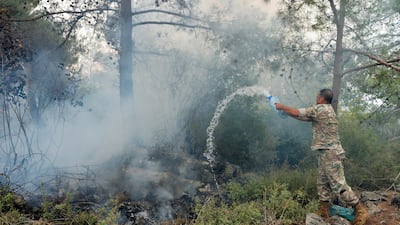This week, Lebanon was reeling under its worst wildfires in decades. Entire homes and villages were destroyed and pine trees and cable poles taken out, largely in the southern Chouf region but also in the north of the country. The director of civil defence reported more than a hundred blazes on Monday alone, with images of the destruction making international headlines.
No picture captured this tragedy better than that of a Lebanese soldier pouring water from a bottle in a futile attempt to douse the fire. There were no fire trucks, water cannon or firefighters rushing to the scene; just one man desperate to help but left with no means to do so. His gesture has become a symbol of all that has gone wrong in Lebanon – and the helplessness many feel.
This natural catastrophe could have been curtailed. Instead, authorities were left to face their own incompetence and mismanagement as homes, shops and lush greenery burnt to the ground. Underfunded and short of means, the Civil Defence could not be dispatched to all the affected areas. In many cases, civilians were left to fend for themselves. One volunteer – Salim Moujahed, a brave father of two – died of a heart attack as he battled the blaze.
The scale of the fires required aerial intervention and while Lebanon lacks firefighting aircraft, its government could have put to use three helicopters it had been donated. But for the past 10 years, cash-strapped authorities did not even bother to maintain them. As a result, the aircraft were unusable. One more example of the failure to manage the country’s resources.
Twelve years ago, Lebanon suffered from similar devastating fires, forcing the government to launch a national fire management strategy. Yet it was never implemented. This cycle of inefficiency and neglect left authorities scrambling for help this week. Army helicopters were rushed to the mountains to put out the flames with the help of anti-riot water cannons, while the government asked neighbouring Cyprus, Greece and Jordan to send firefighting planes to save Lebanon from the flames. Even Palestinian firefighters rushed out of their refugee camps to stop the inferno from spreading throughout the Chouf.
Despite this show of bravery and solidarity, the fires have caused immense harm to the landscape and the people living in those affected areas. Not only have authorities proved they were unable to protect the country and keep its residents safe when this should be their prime concern, but worse, some officials banked on this tragedy to pursue their own sectarian agenda.
Mario Aoun, a member of parliament representing the Free Patriotic Movement – the Christian party launched by President Michel Aoun – openly stated on television that "there are large question marks around the fires – at the risk of sounding sectarian – but why were all the fires located in Christian areas?."
In fact, fires raged in Druze areas in Chouf and spread to mostly Muslim-populated regions of northern Lebanon, even extending to the Syrian coast all the way to Latakia. So not only is Mario Aoun’s statement inaccurate, but such rhetoric is dangerous and could stir up sectarian sentiments.
Sectarian politics, however, appear to have played a role in the failure to reign in the fires - though not in the way Mario Aoun had framed it. According to Lebanese daily L'Orient-Le Jour, forest rangers were never delegated to the affected areas because of sectarian considerations. They could have helped spot arsonists or deliver aid while trying to stop the fires from spreading.
The Lebanese president and Prime Minister Saad Hariri have called for an investigation into claims of arson. In the meantime, speculation can only serve to deflect attention from those who need it most and provide excuses for the government's own failings.
The Chouf region that fell prey to the fires is a microcosm of Lebanon’s diversity. A verdant mountainous region where Christian, Druze and Sunni communities live side by side, it is also home to the country's largest cedar reserve in Barouk. Even though its history is marred with sectarian infighting, it also reflects Lebanon’s hidden beauty and the wealth of potential that the Mediterranean country can unlock. That authorities have failed to keep their people safe, from Mechref to Akkar, and protect the cedar trees that have come to be a symbol of the nation, should put them to shame. All efforts must go into replanting and rebuilding the affected areas, and rolling out much-needed efforts to prevent such tragedies from ever happening again.

